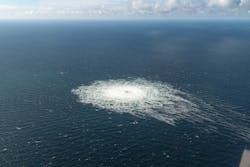Nord Stream natural gas pipelines spring multiple leaks
The Danish Energy Agency (DEA) says that a total of three leaks have been detected on the Nord Stream 1 and 2 natural gas pipelines, two on Nord Stream 1 and the third on Nord Stream 2. The leaks are northeast and southeast, respectively, of Bornholm, Denmark.
Danish authorities were informed the evening of Sept. 26, 2022, of a major pressure drop on Nord Stream 1, having received notice of a leak on Nord Stream 2 earlier in the day. Nord Stream 2’s pressure dropped to 7 bar from 105 bar.
Since neither pipeline was operating, the leaks are not expected to have an immediate impact on the supply of gas to Europe and Denmark. Nord Stream AG, however, described the damage as "unprecedented" and said in a statement to Russian state news agencies that Nord Stream 1 would not be fit for service again until at least Oct. 26.
The leaks prompted the Danish Maritime Authority to release a navigational warning establishing a 5-nautical mile no-sail zone and 1-km no-fly zone around the area. Ships could lose buoyancy if they enter the area, in addition, there may be a risk of ignition over the water and in the air.
Germany stopped certification of Nord Stream 2 in February 2022 following Russia’s invasion of Ukraine, construction and line fill having been completed in 2021 (OGJ Online, Feb. 22, 2022). PJSC Gazprom indefinitely suspended shipments on Nord Stream 1 earlier this month (OGJ Online, Sept. 2, 2022).
Nord Stream 1 and 2 run roughly parallel to one another crossing the Baltic Sea from the Russian coast to Greifswald, Germany. Each has a design capacity of 55 billion cu m/year.
DEA recommended Energinet, the Danish national electricity and gas system operator, raise the sector preparedness level in both electricity and gas, requiring companies to heighten safety procedures at plants, buildings, and installation. “Breaches of gas pipelines happen extremely rarely, and therefore we see reason to raise the level of preparedness,” said DEA director general Kristoffer Böttzauw.
German regulators concurred that the leaks would not have an immediate effect on gas supplies. But Bundesnetzagentur president Klaus Mueller remarked on Twitter the simultaneous drop in pressure on both lines “underscores the German network regulator’s assessment that the situation is tense.”
About the Author
Christopher E. Smith
Editor in Chief
Chris joined Oil & Gas Journal in 2005 as Pipeline Editor, having already worked for more than a decade in a variety of oil and gas industry analysis and reporting roles. He became editor-in-chief in 2019 and head of content in 2025.

